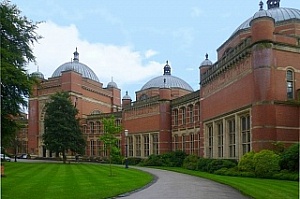The results of the project ExoMet were summarized at a final meeting in Birmingham, England, held recently. 30 organizations from 12 countries participated in this large-scale programme, implemented under the auspices of the European Space Agency. Major corporations and universities joined forces to create new materials for space, aviation, and mechanical engineering. TSU was the only organization representing Russia in this project.
The delegation of Tomsk State University was Alexander Vorozhtsov, Head of the Laboratory of High-Energy and Special Materials; Alexander Potekaev, Director of SPhTI TSU; Ernst Schrager, Dean of Faculty of Physics and Engineering; and 3 young scientists working for several days in Birmingham.
The main task of ExoMet is creating new technologies for processing liquid metals with the help of external fields. This will help to radically change the approach to managing the microstructure of metal alloys and composites. TSU scientists have made a great contribution to solving technical challenges faced by the project participants. In particular, they were first in the world to find a method for hardening aluminum alloys using special ligatures with nanoparticles treated with a shock wave. The new method helped improve the strength characteristics of the light alloys by 30% and improve other properties of the metal, including its electrical conductivity.
- The project would not have taken place without the participation of TSU, - says Dmitry Eskin, Professor at Brunel University London (UK), a member of the International Academic Council of Tomsk State University. - The group of Alexander Vorozhtsov was engaged in creating new technologies for the use of nanopowders in light alloys and experienced developments of other participants of the international project and investigated properties of their developments.
One of the developments of TSU physicists and engineers was a frame with enhanced performance properties to accommodate the electronic equipment of satellites, which was demonstrated at the final meeting. Earlier, assembly from multiple parts was used to create a similar design. TSU scientists managed to cast it as a whole that reduced the wall thickness and the weight of the frame.
- The scientific work within ExoMet has been completed, - says Alexander Vorozhtsov, Head of the Laboratory of High-Energy and Special Materials. - But we have a lot of new ideas. Of course, we will continue to research smart materials. This topic is now in great demand, and it is clear that they are the future. Therefore, there are 2 new institutes: Smart Materials and Technologies and TSSW - Siberian Institute of the Future, for TSU’s engagement in this area.
The question of creating of special materials for use in extreme conditions (in particular, at very low temperature) is particularly relevant to TSSW. Such alloys should be resistant to an aggressive environment and have a high strength and corrosion resistance. TSU scientists will work to create them with colleagues from the University of Brunel.

